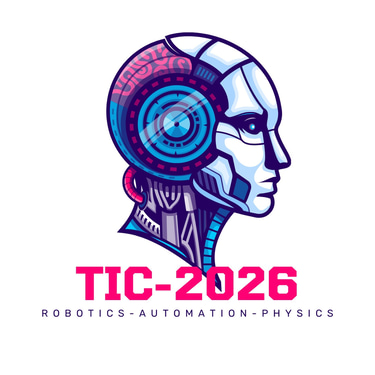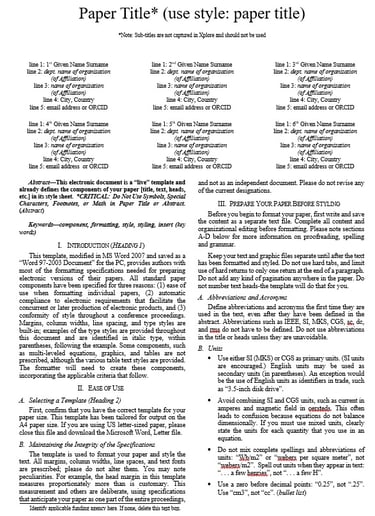Call for Papers
Track 1 - Physics
TIC-2026 has obtained approval from IEEE for publishing the proceedings in IEEE Xplore, which will eventually get indexed in Scopus database. This conference is also technically co-sponsored by IEEE SMC Society. We invite researchers, practitioners, and students to submit their original research papers and case studies related to the conference themes. All submissions will undergo a peer-review process, and accepted papers will be published in the conference proceedings.
Track 3 - Artificial Intelligence
Machine Learning
Deep Learning
Natural Language Processing
AI Algorithms
Fuzzy & Neural System
AI Planning Strategies and Tools
Reinforcement Learning
Robotics
Computer Vision
Expert Systems
Pattern Recognition
Component Analysis
Social Network Analysis
Data Mining
Challenges with Big Data
Techniques for Data Visualization
Big data Analytics and Applications
Data, Text, Web Mining, & Visualization
Track 2 - Computing
Cloud Computing
Edge Computing
Intelligent Computing
Soft Computing
Multi-core Architecture
Parallel & Distributed Systems
Agent-Based Systems
Autonomic Computing
Service-Oriented Computing
Mobile & Ubiquitous Computing
GPU Programming
Parallel & Distributed Algorithms
Compiler Technologies for HPC
Peer to Peer Computing
Network Storage Systems
High Performance Storage Systems
Track 4 - VLSI
VLSI Circuits and Systems
Chiplets based heterogeneous designs
VLSI for Automotive Systems
Sensors interfacing circuits and systems
Cyber Physical Systems
Embedded Operating Systems
RF Circuit Design and Testing
Emerging Trends in VLSI
Reconfigurable Systems
System on Chip
Design of MEMS Devices
Nanotechnology
Photovoltaics
Digital System Design and Validation
Field Programmable Systems
System Level Design
Physical Design and Testing
Thin film and devices
Advanced CMOS Technology
Track 5 - Internet of Things
Intelligent Systems for IoT
Environmental Monitoring
Machine to Machine/Device Communications
Network Design and Architecture
Infrastructure Management
IoT and Big Data
Home Automation
Security and Privacy
Social Implications of IoT
Technological focus for Smart Environments
Smart City Case Studies
Architecture for secure and interactive IoT
Blockchain for IoT Security.
Emerging IoT
Track 6 - Power Systems
Power system planning and scheduling
Power System Protection, Operation and Control
Power System Modelling, Simulation and Analysis
Power system reliability and Security
power System Stability, Dynamics & Control,
Power System Automation, Protection & Relaying,
Power System Monitoring,
Restructuring of Power System, Electricity Markets and Energy Pricing,
Smart Grid and Smart Technologies,
Distributed Generation, Renewable Energy Sources and Micro/mini–Grid Operation,
High Voltage & Insulation Engineering,
Smart sensing for power technologies
Applications of AI to Power systems
Track 7 - Renewable Energy
Renewable energy sources and Technology
Energy and Power
Integration of energy storage systems
Solar/Wind energy systems
IoT for Renewable Energy Technologies and Systems
Energy security and energy systems
Energy Conversion and Energy Efficiency
Energy Analysis and Energy Transfer
Biomass, Hydrogen based sources
Hybrid Energy Systems
Energy Harvesting,
Green energy issue
Energy equipment and energy management
Thermal and Wind Energy Engineering
Nuclear Engineering and Hydrogen Energy Resources
Track 8 - Electric Vehicles
Plug-in-Electric vehicles (Electric buses, electric trains, electric aircrafts and electric ships)
Electric vehicle charging station
Impact of electric vehicles to power grids
Hybrid electric vehicles
Vehicle to grid and vehicle to home
Hydrogen-Powered vehicles
Utilization of hydrogen in transportation
Electric motors for light and heavy electric vehicles
Active and Passive Vehicle Safety
Automated Vehicles
Connected and Autonomous Vehicles
Smart Mobility
Green Manufacturing & Energy Management
Internal Combustion Engines
Vehicle Control
Vehicle Environment Perception
Nuclear Physics
Thermodynamics
Electromagnetism
Relativity
Quantum mechanics
Optic
Astrophysics
Mechanics
Particle Physics
Condensed Matter Physics
Microwave Compatibility
Electromagnetic Interference
Microwave Theory and Techniques
Photonics
Network Performance Analysis
Paper Format
IEEE Format has to be strictly followed.
Formatting the text as two columns, in Times New Roman, 10 pt.
Including a byline, an abstract, and a set of keywords at the start of the research paper
Place figures, tables, and equations at the top or bottom of a column, not in the middle
We encourage authors to use Mendeley, EndNote, Zotero or other reference tools for Referencing rather doing it manually. Ensure to use IEEE Reference Style
Author names, departments, affiliation, email ID mentioned in the manuscript will be used and NO further changes are entertained by TIC-2026 Scientific Committee
Download IEEE Paper Format in word document for your convenience.
Submission of Papers
Authors are required to submit their papers adhering to the IEEE format.
The final paper should be written in English with a maximum paper length of eight printed pages including figures strictly with the IEEE manuscript template.
The working language of the conference is English, which will be used for all printed material, presentations and discussion
The submitted papers must be original and unpublished.
Double-blind peer reviews will be followed.
All accepted papers will be forwarded to IEEE Xplore. The copyright of manuscripts have to be transferred to IEEE by approving the automated email from IEEE post-submission.
Any accepted paper included in the final program is expected to have at least one author attend and present the paper at the conference.
Submissions, refereeing, and all correspondence will be done electronically.
The Microsoft CMT service is used for managing the peer-reviewing process for this conference. This service was provided for free by Microsoft and they bore all expenses, including costs for Azure cloud services as well as for software development and support.
Important Dates
Paper Submission
March 30th 2026
Date of Notification
March 17th 2026
April 30th 2026
Registration Deadline
At least one author must register to include the paper in the conference.
If more than one author of an accepted paper wish to attend the conference, all such authors need to register separately as listener by paying applicable registration fee.
Certification Available (hardcopy/ softcopy) only for paid Registration.
Each registration covers only one paper per registrant. Each additional accepted paper can be registered at applicable as per the category of authors.
Please keep a copy of the Payment Transaction ID, generated by your bank. You may need these later in registration process or if you need to track your payment/registration.
Unregistered papers will not be included in the final program for presentation and publication in our Conference Proceedings
No refunds will be made after payment
Registration Details
Publication
TIC-2026 has been approved by IEEE, therefore all presented papers will be published in IEEE Xplore, which will eventually get indexed in SCOPUS databases
We would like to commit that our partnered Conference Proceedings will be indexed in Scopus databases, as we have maintained this since past years
When will your paper get published in IEEE Xplore and when will it be indexed?
Plagiarism Policy
TIC-2026 has zero tolerance for any intentional breach of copyright law. Please run the manuscript through similarity software such as Turnitin or iThenticate and check whether it is lesser than 10%. The benchmark should be a similarity index of 10% but we shall examine on an individual basis. A high percentage from one source is a red flag. Also note that usage of common formulas, equations and general terms are flagged but these should be discounted. All reported sources from books or journals must be cited and referenced. Reprinting author’s previous work needs permission as well and must be fully acknowledged. IEEE checks plagiarism through CrossCheck once we upload the articles, therefore, there is a possibility that similarity index may inflate or decrease. So while checking at your end, please ensure to have the similarity index as low as possible.
Whether intentional or not, plagiarism is a serious violation.
Plagiarism is the copying of ideas, text, data and other creative work (e.g. tables, figures and graphs) and presenting it as original research without proper citation.
We define plagiarism as a case in which a paper reproduces another work with at least 10% similarity with and without citation.
Also single source similarity should not exceed not more than 3%
We are Very serious about the Plagiarism Content; we accept only original Article.
The article may be rejected any time if found plagiarized. Also, the registration amount will not refunded at any circumstance

